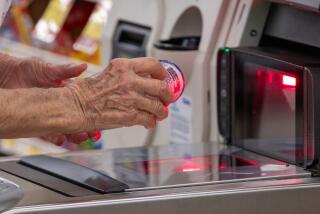Bill Would License Cashing Outlets and Regulate Fees
- Share via
Check cashing is one of the fastest growing financial services, but one of the least regulated.
The job of policing the nation’s 5,000 check-cashing outlets--which charge anywhere from 1% to 20% of a check’s face value--is left to the states. At present, only 11 states place a ceiling on check-cashing fees or require licenses.
All that could change, however, as more outlets spring up and as Congress considers legislation that would impose federal regulations and make it easier for millions of Americans without bank accounts to gain access to their money.
A bill introduced by Reps. Cleo Fields, D-La., and Albert Wynn, D-Md., debated this summer, would require check-cashing operations to be licensed by the Federal Trade Commission. It also would set a maximum check-cashing fee of 0.85% of the check amount, or 50 cents, whichever is greater.
In addition, the bill would require all financial institutions to cash government checks.
Earlier this year, Sen. Howard Metzenbaum, D-Ohio, introduced another in a series of basic checking bills. His proposal, opposed by the banking industry, would force banks to offer a low-cost checking account or government check-cashing service.
The check-cashing industry opposes the House legislation, arguing that capping fees interferes with the free-market economy.
“Any governmentally imposed rate structure should be reviewed at the state level, not the federal level,” Jeffrey Silverman, a spokesman for the National Check Cashers Assn., said at a recent subcommittee hearing.
But consumer groups praise such proposals.
“No one can build assets without a means to cash a full paycheck, pay monthly bills and safely save what is left over--however meager,” said Chris Lewis, of the Consumer Federation of America.
More to Read
Inside the business of entertainment
The Wide Shot brings you news, analysis and insights on everything from streaming wars to production — and what it all means for the future.
You may occasionally receive promotional content from the Los Angeles Times.










